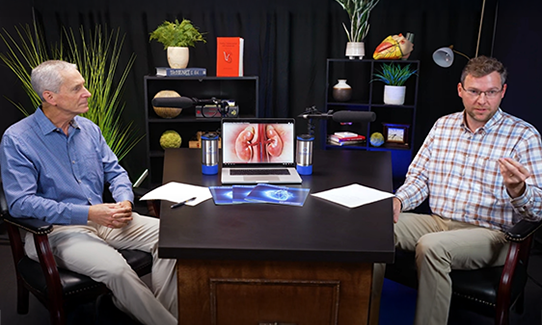

Oct 10 2025
We're All Heart Episode Eight


Summary
High blood pressure affects millions - but many don’t realize they have it. In this episode of We're All Heart, Dr. Barry Bertolet and Dr. Baker Boler discuss what defines hypertension, why it matters, and how it impacts the heart, brain and kidneys. They introduce a new procedure that is promising for patients with resistant hypertension. Whether you're a patient, caregiver, or healthcare professional, this episode offers valuable insights.
We're All Heart: Episode Eight

Podcast Transcript
Introduction: Life is about the moments that make your heart tick, and we’re here to keep it ticking strong. I’m Dr. Barry Bertolet, and this is We're All Heart, where we dive into the latest cardiac care with the experts who live it every day.
From breakthrough procedures to the most cutting-edge treatments, we're putting heart health front and center.
We're All Heart is brought to you by North Mississippi Health Services in partnership with Cardiology Associates of North Mississippi. Let's get to it.
Dr. Barry Bertolet: Welcome back to We're All Heart. And today we have Dr. Baker Boler with us, who's going to be talking to us about hypertension, which is high blood pressure. So welcome. Dr. Boler, would you like to introduce yourself to the audience?
Dr. Boler: Yes. My name is Baker Boler. I'm a general cardiologist with Cardiology Associates.
Been here, I guess, about two years now, and so really enjoyed my time here. And I thank you, Dr. Bertolet, for having me today.
Dr. Bertolet: Absolutely. So today we're talking about hypertension. So what is hypertension? What is that?
Dr. Boler: So hypertension is an elevated measurement of our blood pressure. And so blood pressure is the pressure that the heart generates when it squeezes. We measure two numbers, you know, the top and the bottom number. Top number being systolic, bottom number being diastolic. So systolic is when the heart's squeezing, and the bottom number is diastolic is when the heart is relaxed. And so we measure that, of course, with a blood pressure cuff, and we're measuring the pressure in the arteries. And so that pressure in the arteries over time can cause damage to the body, whether that's heart, kidneys, brain. And those are things that we monitor to watch risk for progression of disease.
Dr. Bertolet: And when we're talking about measuring that number that's in the arm, or sometimes people do that at the wrist, what do those numbers mean? We got a top number and a bottom number.
What does the top number mean? What does the bottom number mean?
Dr. Boler: So, ideally, the guideline suggests a blood pressure less than 120 over 80 is normal.
We can get away with a blood pressure between 120, 129 over 80 as elevated and not quite meet the diagnosis of hypertension.
(Continued)

We're All Heart
Join Dr. Bertolet for more episodes featuring local experts in all areas of heart health. We'll learn about the cutting-edge treatments offered right here in north Mississippi - often before the rest of the state or even nation. New episodes drop on YouTube or anywhere you get your podcasts every other week.

We're All Heart
Join Dr. Bertolet for more episodes featuring local experts in all areas of heart health. We'll learn about the cutting-edge treatments offered right here in north Mississippi - often before the rest of the state or even nation. New episodes drop on YouTube or anywhere you get your podcasts every other week.
Dr. Boler: But we meet the diagnosis of hypertension when the top number is over 130. Stage one is 130 to 139, and then as well as the bottom number of 80 to 89. Now, stage two, a little more advanced stage, is when the top number is over 140 or the bottom number is over 90.
Usually that requires medicines immediately. Stage one -we can kind of get away with lifestyle modification and then medicines if we can't control with that.
Dr. Bertolet: So that's probably going to surprise a lot of people that if you had a blood pressure of 130 over 85, you have high blood pressure and you need to do something about it. So that's not normal anymore. So if 120 over 80 is, is the ideal where you need to be at 130 over 85, we need to start thinking lifestyle modifications and maybe even moving toward medications, is that right?
Dr. Boler: That's correct.
Dr. Bertolet: Wow. So that's different. So how frequently do we diagnose high blood pressure in people today?
Dr. Boler: So I recommend, you know, as we're dealing with adults, that we start managing people once they reach the age of 18. But every year someone should know their blood pressure and particularly that risk for blood pressure or prevalence goes up once you get to the age of 40. So every age, once you reach the age of 40, you need to be knowing your blood pressure at least once a year. If you do not have a diagnosis of blood pressure, which, but of course if you have a diagnosis of blood pressure, that becomes something we check a lot more regularly.
Dr. Bertolet: So if I had 10 40 year olds in the room, how many of them have high blood pressure, do you think?
Dr. Boler: The number specifically, I would think would say around like 40 to 50%. Is that about right?
Dr. Bertolet: Yeah. And then as you mentioned earlier, as you get older in life, that prevalence or that chance of you having high blood pressure does go up. So if you're 70 or 80, what do you think about the prevalence or the chance of having high blood pressure then?
Dr. Boler: Well, most of my patients over the age of 75 are in blood pressure medicine and I really think the prevalence is closer to that, greater than 80%, so quite common at that age.
Dr. Bertolet: So we know that the blood pressure number that we measure over here is sort of the marker of maybe an internal disease that may be going on that's causing our blood pressure to go up. What are some of the causes that a person may have that creates the high blood pressure?
Dr. Boler: I think number one that we see is genetics. A lot of times family history of hypertension will see that carry over to the patient. But I think in Mississippi we're seeing lifestyle choices.
Whether or not that's high salt intake, that's obesity, lack of sleep, stress, sedentary lifestyle, all those are going to be contributing to your elevated blood pressure.
Dr. Bertolet: So those are some lifestyle things. If we're eating too much salt, overweight, or sitting too much on the couch—if we undo those things, can we lower the blood pressure?
Dr. Boler: That's exactly right. Specifically, if you meet certain goals in weight loss, you can see specific improvements in your blood pressure.
Dr. Bertolet: Wow, that's very interesting. What about medical issues? Are there any that may elevate someone's blood pressure that we need to be concerned about?
Dr. Boler: Yes. One of the more prevalent issues, especially with obesity in Mississippi, is sleep apnea. Being screened for sleep apnea is important because it's a common cause of high blood pressure. There are also rarer cases involving elevated hormones—we screen for a couple of different ones. Sometimes, a tight kidney artery can elevate blood pressure. Alcohol use is another factor I always address with my patients.
Dr. Bertolet: Yeah, I read an interesting study from England. They had participants in a hospital drinking pints of ale, and their blood pressure went up. When they stopped drinking, it came right back down. So if we have high blood pressure, what does that do to our body? What are the consequences of leaving it untreated?
Dr. Boler: Great question. We're talking about heart disease—heart failure, heart attack risk, and rhythm issues like atrial fibrillation. Hypertension increases the risk of aortic dissection.
For the brain, there's a risk of stroke and small vessel disease, which can be linked to early-onset dementia. And in Mississippi, kidney disease is a major concern. High blood pressure can lead to poor kidney outcomes, including chronic kidney disease and dialysis.
Dr. Bertolet: As you mentioned, in 2025 the American College of Cardiology released new hypertension guidelines. There was something surprising about memory loss and dementia. Can you share more?
Dr. Boler: It mainly relates to small vessel disease. Even if blood pressure normalizes, prior elevation can cause volume loss in the brain, leading to dementia over time.
Dr. Bertolet: So these new guidelines suggest that controlling blood pressure is a major way to prevent memory loss and dementia as we age. That's important. What about racial differences? Are the consequences of high blood pressure different among Caucasians, African Americans, and Hispanics?
Dr. Boler: Yes, there's a significant disparity. Over 50% of African Americans have elevated blood pressure. For Caucasians, it's around 30–40%. Hispanic males also show higher rates of elevated blood pressure.
Dr. Bertolet: I read a study showing that at the same blood pressure, African Americans are more likely to have kidney problems than Caucasians. So they need to be even more diligent. If we lower blood pressure, can we prevent kidney failure, strokes and aortic tears?
Dr. Boler: Yes. For every 20-point increase in systolic pressure above 120, the risk of adverse events doubles. Even small reductions can significantly lower risk.
Dr. Bertolet: That’s powerful. Now, for those who don’t want to take medication, are there easy, non-medical things they can do at home to lower blood pressure?
Dr. Boler: Absolutely. For stage one hypertension, we start with lifestyle changes—weight loss, increasing physical activity (90–150 minutes of moderate exercise weekly), and a low-salt diet. African Americans are especially sensitive to salt, so they benefit greatly from dietary changes. Limiting alcohol and reducing stress through yoga, breathing exercises, or meditation also helps.
Dr. Bertolet: I tried yoga recently—it’s tough! And fast food is high in salt, so avoiding it is key. What about medications? If lifestyle changes aren’t enough, what are the best options?
Dr. Boler: We start with three classes: ACE inhibitors or angiotensin receptor blockers (like lisinopril or losartan), calcium channel blockers (like amlodipine or nifedipine), and thiazide diuretics (like hydrochlorothiazide or chlorthalidone). If blood pressure remains high, we may add spironolactone for resistant cases. Some patients end up on 4–6 medications, often due to genetics.
Dr. Bertolet: You mentioned aldosterone earlier. What does spironolactone do in that context?
Dr. Boler: It blocks aldosterone, a hormone from the adrenal glands that raises blood pressure. In some cases, we find tumors that secrete aldosterone, and surgery may be needed. Blocking that hormone can significantly improve blood pressure.
Dr. Bertolet: Pro tip: if your potassium level is low, you may have too much aldosterone. Something to watch for in your labs. Now, if someone is on three medications and still has high blood pressure, what’s next?
Dr. Boler: We discuss options. At Cardiology Associates, we do a lot of research. Dr. Bertolet, you’ve been involved in a new procedure, right?
Dr. Bertolet: Yes. There’s a new FDA-approved procedure using radiofrequency energy to calm the nerves between the brain and kidneys that drive up blood pressure. It’s similar to a heart cath, takes about 45 minutes, and is outpatient.
We’ve done about 100 of these, and it works. In clinical trials, we saw a 10-point drop in six months and up to 20 points over two to three years. Medicare covers it, and we’re working with private insurers.
Dr. Boler: That’s a great solution—better than adding a fifth or sixth medication.
Dr. Bertolet: Definitely. It may even help reduce the number of medications. So if someone’s struggling with blood pressure despite working with their primary care provider, where can they go?
Dr. Boler: Come to Cardiology Associates. We’ll evaluate for secondary causes and reinforce lifestyle changes. We can often lower blood pressure without more medication, and now we have this new option too.
And now that we have a new option like this, it's always great to have that in our arsenal to further lower blood pressure without add additional medicines.
Dr. Bertolet: Right? Yeah. I mean, that's. That's the key. You'd like to get control without that. So one of the things that we've been asking in the slogan for north Mississippi is that you are our true north.
So here's a question. I'm going to toss it back to you.
What is your true north? What brought you to north Mississippi? What do you look to look forward to maybe doing in your career here in Tupelo?
Dr. Boler: Well, I guess I could take that question long, literally being my true north. I'm from Greenwood, did really most of my training in Jackson, was there for about 12 years.
So I came north to Tupelo.
And so what I've really found is, you know, Tupelo is an easy place to live, easy to raise a family, have all the amenities you need, also have a great sense of community.
And so I guess everything that kind of ties together for me a great opportunity is have such an advanced healthcare system with a small town feel. So I guess that's my true north in a literal sense.
Dr. Bertolet: That's a wonderful summary, and I think that's almost part of what this podcast series was all about to introduce in our small town of Tupelo.
What a fantastic medical system that we have here. So thank you so much for spending time with us today, educating us about hypertension, high blood pressure and what we can do to make that better.
Dr. Boler: Oh, well, thank you for having me. I feel like I'm here to fireside chat with a historical figure.
Dr. Bertolet: All right, we're out.
We're All Heart is brought to you by North Mississippi Health Services in partnership with Cardiology Associates of North Mississippi.
If you're over 35, schedule a heart screening to identify your risk of heart disease. Request an appointment online or call 1-800-THE DESK (1-800-843-3375).

Subscribe to Our Newsletter
Like this content and want to get more? Sign up for True North, the health and wellness newsletter from North Mississippi Health Services!

Subscribe to Our Newsletter
Like this content and want to get more? Sign up for True North, the health and wellness newsletter from North Mississippi Health Services!

Nurse Link®
Not sure if you need Urgent Care or the ER? Call 1-800-882-6274 anytime to speak directly to a registered nurse and get immediate answers. Using computerized medical protocols, nurses direct callers to the most appropriate treatment. Our nurses are available 24 hours per day, seven days per week.